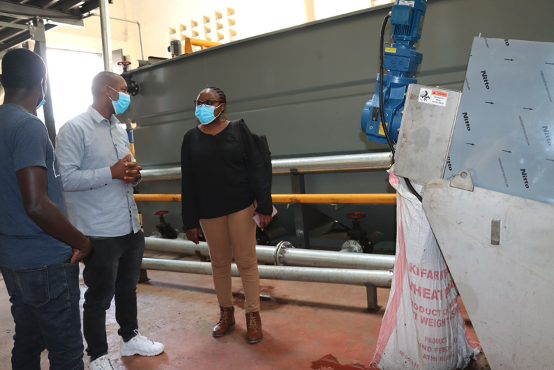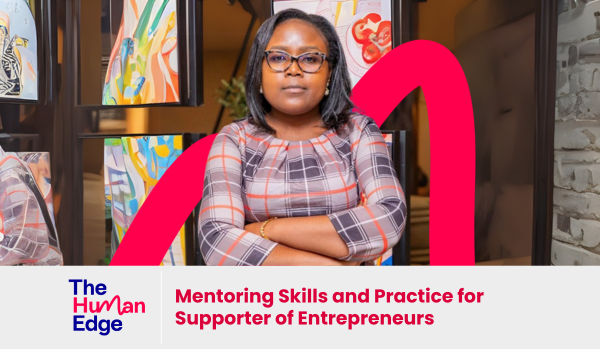When Christine Mbaabu, Programme Manager at the Kenya Climate Innovation Centre (KCIC), enrolled in The Human Edge’s Mentoring Skills and Practice (MSP) course, she was already deeply involved in supporting entrepreneurs. Managing a 10-month mentoring programme for climate-focused entrepreneurs, Christine had years of hands-on experience—but she had never received formal mentor training. What she found in the MSP course went far beyond her expectations, equipping her with the tools, structure and confidence to elevate her approach to mentoring.
Christine had been mentoring entrepreneurs for years, but her knowledge was based purely on experience and intuition. She had seen first-hand how mentoring could transform businesses—having previously worked with a small enterprise that grew from KES 20 million to KES 1 billion in revenue thanks to structured mentoring support. However, she often questioned whether she was guiding mentees in the right way and whether there was a more effective framework she could follow.
Her goal in joining the MSP course was clear: to gain a structured understanding of the mentoring process and refine her skills to better serve the entrepreneurs in her programme.
Christine describes her experience in the MSP course as a revelation. Her initial expectation was simply to validate her existing knowledge, but she quickly realised there was so much more to learn. “I had been doing mentorship based on experience and the ‘school of hard knocks.’ But through this programme, I discovered structured frameworks, tools, and best practices that completely reshaped my approach.”
Key takeaways from the programme that had the biggest impact on Christine’s work included:
- Mentoring as a process: Understanding that mentoring has clear phases helped her set better expectations with mentees. Previously, she struggled with mentees who were reluctant to exit the programme. Now, she clearly communicates the mentoring journey from the outset, ensuring a smoother transition when the programme ends.
- Practical tools & templates: Christine was surprised to learn that mentoring templates even existed. These tools provided structure to her mentoring relationships and have since been widely adopted within KCIC.
- Powerful feedback models: One of the most valuable lessons was learning how to give constructive feedback using models like ‘What Works Well, Even Better If, and Keep On Doing’ (WEK). She now applies this not only in mentoring but also in her leadership role, using it to engage her team and mentees in a more constructive way.
- Confidence & purpose: The course didn’t just enhance Christine’s skills—it reinforced her belief in her ability as a mentor. “The feedback I received from experienced mentors in the course was overwhelming. It made me realise—this is what I was born to do.” The experience was so transformative that she is now considering pivoting her career towards full-time entrepreneurship mentoring in the future.
Christine didn’t just keep these learnings to herself. She has actively shared the MSP course’s insights within her organisation, directly influencing how mentoring is structured at KCIC.
- She introduced key mentoring frameworks to her team, ensuring that all programme managers adopt a structured approach.
- She shared the mentoring templates with colleagues and mentees, improving the consistency and quality of mentoring sessions.
- Inspired by her experience, two additional KCIC staff members enrolled in a later cohort of the MSP course, further embedding best practices within the organisation.
Christine’s vision for the future has been profoundly shaped by the MSP course. While she continues to refine the mentoring programme at KCIC, she also sees herself building a long-term career in mentoring. “This course unlocked a passion I didn’t realise ran so deep. I now see mentoring as more than just a function of my job—it’s my purpose.”
As an immediate next step, she is planning an internal training for KCIC staff to further embed structured mentoring practices across the organisation. The impact of the MSP course is not only strengthening Christine’s personal growth but also expanding mentoring capacity at a systemic level within the climate innovation ecosystem.
Christine’s journey demonstrates the profound impact of structured mentor training. Her story is a testament to the value that the Mentoring Skills and Practice (MSP) course brings—not just to individual participants but to entire organisations and the entrepreneurial ecosystems they support.
For anyone considering joining the MSP course, Christine offers an emphatic endorsement: “I would recommend this programme 100%. The approach is practical, the content is deeply relevant and the impact is immediate. I wouldn’t change a thing.”
Christine’s experience is a powerful reminder that mentoring isn’t just about experience—it’s about equipping people with the right tools, frameworks, and confidence to create lasting impact. Thanks to the MSP course, she is now leading with clarity, purpose and an unwavering commitment to supporting entrepreneurs at scale.

Christine participated in the Westerwelle Foundation’s Mentor Programme in September 2024, alongside 55 mentors from Kenya, Rwanda, and Europe. For more details on the Mentoring Skills and Practice Course, click here.

